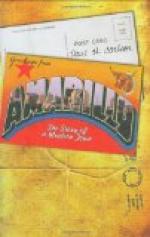It was the story of the famine that really captured the audience; and Tommy told it well, with the true Irish fire, in a beautiful voice.
In the front seat of the parquette a little old man in a wrinkled black broadcloth, with a bald head and a fringe of whisker under his long chin, and a meek little woman, in a red Paisley shawl, wept and laughed by turns. They had taken the deepest interest in every essay and every speech. The old man clapped his large hands (which were encased in loose, black kid gloves) with unflagging vigor. He wore a pair of heavy boots, the soles of which made a noble thud on the floor.
“Ain’t it wonderful the like of them young craters can talk like that!” he cried; “shure, Molly, that young lady who’d the essay— where is it?”—a huge black forefinger travelled down the page— “‘Music, The Turkish Patrol,’ No—though that’s grand, that piece; I’ll be spakin’ wid Professor Von Keinmitz to bring it when we’ve the opening. Here ’tis, Molly: ’Tin, Essay. The Darkest Night Brings Out the Stars, Miss Mamie Odenheimer.’ Thrue for you, mavourneen! And the sintiments, wasn’t they illigant? and the lan-gwidge was as foine as Pat Ronan’s speeches or Father— whist! will ye look at the flowers that shlip of a gyirl’s gitting! Count ’em, will ye?”
“Fourteen bouquets and wan basket,” says the little woman, “and Mamie Odenheimer, she got seventeen bouquets and two baskets and a sign. Well,” she looked anxious, but smiled, “I know of siven bouquets Tommy will git for sure. And that’s not countin’ what Harry Lossing will do for him. Hiven bless the good heart of him!”
“Well, I kin count four for him on wan seat,” says the man, with a nod of his head toward the gay heap in the woman’s lap, “barrin’ I ain’t on-vaygled into flinging some of thim to the young ladies!”
Harry Lossing, in the seat behind with his mother and Mrs. Carriswood, giggled at this and whispered in the latter lady’s ear, “That’s Tommy’s father and mother. My, aren’t they excited, though! And Tommy’s white’s a sheet—for fear he’ll disappoint them, you know. He has said his piece over twice to me, to-day, he’s so scared lest he’ll forget. I’ve got it in my pocket, and I’m going behind when it’s his turn, to prompt him. Did you see me winking at him? it sort of cheers him up.”
He was almost as keen over the floral procession as the Fitzmaurices themselves. The Lossing garden had been stripped to the last bud, and levies made on the asparagus-bed, into the bargain, and Mrs. Lossing and Alma and Mrs. Carriswood and Derry and Susy Lossing had made bouquets and baskets and wreaths, and Harry had distributed them among friends in different parts of the house. I say Harry, but, complimented by Mrs. Carriswood, he admitted ingenuously that it was Tommy’s idea.
“Tommy thought they would make more show that way,” says Harry, “and they are all on the middle aisle, so his father and mother can see them; Tim O’Halloran has got one for him, too, and Mrs. Macillarney, and she’s got some splendid pinies. Picked every last one. They’ll make a show!”




